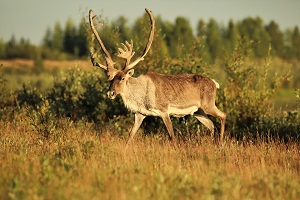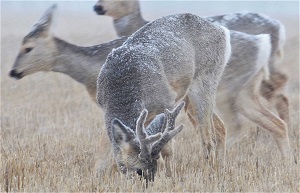Rosneft helped scientists from SibFU to conduct the largest-scale monitoring of wild reindeer migration

As part of a joint project between Rosneft and the Ministry of Natural Resources and Environment of the Russian Federation, scientists from Siberian Federal University conducted the largest-scale monitoring of wild reindeer migration in the Vostok Oil project area in the north of Krasnoyarsk Krai. For the first time in the history of observations of these animals in Eastern Siberia, 112 individuals from the Taymyr-Evenki population were fitted with satellite collars.
The scientists tracked the direction of the animal movements in real time. Based on observations in the eastern and central parts of the Taymyr Peninsula, the number of reindeer was up to 330,000 individuals. According to scientists, the decline in the Taymyr-Evenki reindeer population from 500,000 to 325,000 over the past 25 years is due to global warming. Arctic latitudes have atypical weather conditions for reindeer – greening of the tundra, leading to habitat change and summer migration to colder areas.
In 2024, SibFU scientists, supported by Rosneft, will continue their research in Western Taymyr. The total area of the studied territory will not be less than 360 thousand km2. Such monitoring is necessary to make timely decisions about the conservation of this unique reindeer population. This biological species is extremely important. Wild reindeer are not only a key bioindicator species of the Arctic zone, but also the basis for the preservation of the traditional way of life of the indigenous peoples of the North. Local community representatives are part of the reindeer survey teams and will be able to use the data in their local crafts in the future.
 Rosneft, in cooperation with Siberian Federal University, has been studying the population status, numbers and migrations of wild reindeer in Krasnoyarsk Krai since 2014. Within the framework of the Ecology national project, Rosneft is implementing a corporate program for the study, conservation and monitoring of key species – bioindicators of the sustainability of Arctic ecosystems: polar bears, Atlantic walrus, wild reindeer and ivory gulls.
Rosneft, in cooperation with Siberian Federal University, has been studying the population status, numbers and migrations of wild reindeer in Krasnoyarsk Krai since 2014. Within the framework of the Ecology national project, Rosneft is implementing a corporate program for the study, conservation and monitoring of key species – bioindicators of the sustainability of Arctic ecosystems: polar bears, Atlantic walrus, wild reindeer and ivory gulls.
As part of the 2024-2027 program, Rosneft will carry out large-scale research in the north of Krasnoyarsk Krai, including an aerial survey of polar bears in the Kara Sea, monitoring wild reindeer and studying fish in the mouth of the Yenisei River. In addition, the scientists will map the ecological sensitivity of the shores of the Yenisei Gulf and the adjacent Kara Sea waters by checking the nesting sites of valuable bird species.
.
Rosneft
Information and Advertising Department
April 23, 2024